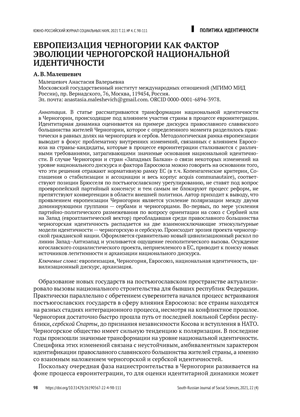Abstract
The article examines the transformation of national identity in Montenegro, which is influenced by the country’s involvement in the Euro-integration process. The issue of national identity of the orthodox majority is controversial and closely related to the political orientation of the dominating groups — the Montenegrins and the Serbs. The paper argues that the EU has demonstrated both direct and indirect impact on the national identity in Montenegro resulting in ethnocultural polarization and the emergence of strong civilizational cleavage between pro-western and anti-western forces, which, in its turn, is also linked to the split between the Montenegrins and the Serbs. The decline of the socialist Yugoslav socialist model which contradicted the EU normative framework caused the search for the alternative sources of national legitimacy and led to the archaization of identity discourse. These claims are observable only if the EU normative documents and the enlargement conditionality principles are taken into consideration. The EU transformative impact on the national identity of the candidate states is regarded as a consequence of adaptive pressure from Brussels. The methodology of the study in based on the radical constructivism optics that aims to identify transformations in the discourse but ignores the variables approach common in neo-institutional Europeanization research.
Keywords
References
- Agreement on Principles of Relations between Serbia and Montenegro within the State Union. Belgrade (March 2002). Retrieved from https://www.consilium.europa.eu/uedocs/cms_data/docs/pressdata/en/sg/69898.pdf
- Bieber, F. (2012). (Ed.) EU Conditionality in the Western Balkans. Abingdon, New York: Routledge.
- Bieber, F. (2002). The Instrumentalization of Minorities in the Montenegrin Dispute over Independence. European Center for Minority Studies, 8. Retrieved from https://www.ecmi.de/publications/issue-briefs/the-instrumentalization-of-minorities-in-the-montenegrin-dispute-over-independence
- Bogičević, Č. (2020). Crnogorski autohtoni i samonikli identitet kao multukulturni diverzitet. URL: http://svetipetarcetinjski.org.me/wp-content/uploads/2020/09/Cedomir-Bogicevic.pdf
- Börzel, T., Risse, T. (2003). Conceptualizing the Domestic Impact of Europe. In K. Featherstone, C. Radaelli (Eds) Europeanization (pp. 57–80). Oxford University Press.
- Caporaso J., Cowles M., Risse T. (Eds) (2001). Transforming Europe: Europeanization and Domestic Change. Cornell University Press.
- Commission Opinion on Montenegro’s application for membership of the European Union. Brussels (November, 2010). Retrieved from https://eur-lex.europa.eu/legal-content/EN/TXT/PDF/?uri=CELEX:52010SC1334&from=EN
- Darmanović S. (1992). Montenegro: Destiny of a Satellite State. East European Reporter, 27, 27–54.
- Djurić, D. (2004). Montenegro’s prospect fur European Integration: on a twin track. South-East Europe Review, 4, 79–106.
- Džankić, J., Keil, S., Kmezić, M. (Eds) (2019). The Europeanization of the Western Balkans. Palgrave Macmillan.
- Džankić, J. (2013). Cutting the Mists of the Black Mountain: Cleavages in Montenegro’s Divide over Statehood and Identity. Nationalities Papers, 41(3), 413–430.
- Đukanović, D. (2014). “Identitetska pitanja” i linije unutrašnjih podela u Crnoj Gori. Biblid. LXVI(3–4), 395–422. DOI: 10.2298/MEDJP1404395D
- Elbasani, A. (Ed.) (2014). European Integration and Transformation in the Western Balkans. Europeanization of Business as Usual? Routledge.
- EU-Western Balkans Summit Declaration. Thessaloniki (21 June 2003). Retrieved from https://www.consilium.europa.eu/uedocs/cms_data/docs/pressdata/en/misc/76291.pdf
- Fagan, A., Sircar, I. (2015). Europeanization of the Western Balkans. Environmental Governance in Bosnia-Herzegovina and Serbia. Palgrave Macmillan.
- Freyburg, T., Richter, S. (2010). National Identity Matters: The Limited Impact of EU Political Conditionality in the Western Balkans. Journal of European Public Policy, 17(2), 263–281.
- Latkina, V. A. (2013). Fenomen evropeizatsii v zapadnoevropeyskih issledovaniyakh. [Europeanization as a Social-Political Phenomenon]. Mezhdunarodnye process [International Trends], 1(32), 49–62.
- Lunkin R. N. Bor’ba tcerkvi i vlasti v Chernogorii: igry avtoritarnogo nacionalizma. [The Struggle of the Church and the State in Montenegro: The Games of the Authoritarian Nationalism]. Nauchno-analiticheskiy Vestnik IE RAN [Scientific and Analytical Herald of IE RAS], 1, 100–107.
- Montenegro 2021 Report. Commission Stuff Working Document. Retrieved from https://ec.europa.eu/neighbourhood-enlargement/montenegro-report-2021_en
- Pavlović, S. (2003). Who are the Montenegrins? Statehood, Identity and Civic Society. In F. Bieber (Ed.) Montenegro in Transition. Problems of Identity and Statehood. Nomos Verlagsgesellschaft.
- Radaelli, C. (2000). Whither Europeanization? Concept Stretching and Substantive Change. European Integration Online Papers, 4(8), 25.
- Radeljić, B. (2013). Europe and the Post-Yugoslav Space. Routledge.
- Raković, A. (2019). Crnogorski separatizam. Beograd: Catena Mundi.
- Rastoder, Š. (2003). A short review of the history of Montenegro. In F. Bieber (Ed.) Montenegro in Transition. Problems of Identity and Statehood. Nomos Verlagsgesellschaft.
- Shul’ga, M. A. (2015). Evropeizaciya: nekotorye osobennosti odnogo koncepta [The Aspects of the Europeanization Concept]. Vek globalizatsii [Vek Globalizatsii], 1, 88–95.
- Stabilization and Association Agreement between the European Communities and the Member States, of the One Part, and the Republic of Montenegro, of the Other Part. Retrieved from https://eur-lex.europa.eu/legal-content/EN/TXT/HTML/?uri=LEGISSUM:4314909
- Subotic, J. (2011). Europe is a State of Mind: Identity and Europeanization of the Balkans. International Studies Quarterly, 55, 309–330.
- Vink M. (2003). What is Europeanization? And Other Questions on a New Research Agenda. European Political Science, 3(1), 63–74.
- Zakon o državnim simbolima i Danu državnosti Crne Gore (“Službeni list Republike Crne Gore”, br. 047/04 od 12.07.2004). Retrieved from https://www.gov.me/dokumenta/b8e6c8c8-f87e-4ddd-91fd-620e5ea87a1d
 Русский
Русский


